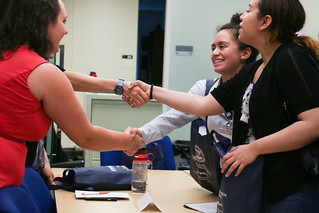Lian Guo GRAD SCHOOL DIARIES
graduate school mentorship research
A Basic Guide to Mentoring Undergraduates in STEM
As graduate students in STEM, we often work with undergraduate students in classroom and laboratory settings. Mentoring undergraduates can be overwhelming, especially if you are working with a lot of students. It can also be a very rewarding and educational experience for everyone involved. I’ve had the privilege to work with 17 undergraduates on my dissertation research over the past four years, and have learned some valuable lessons. These are my tips and advice for graduate student mentors on different aspects of mentorship:
Recruitment
Interview those who are applying to work in your lab. Even though this is a lot of work, it is an easy way to get a sense of who the student is and provides them an opportunity to practice interviewing.
Before interviews, send the students a one-page, clear, jargon-less description of your research and what projects they could potentially work on. This allows students to have time to process and prepare follow-up questions for the interview.
When explaining your research, be very clear about the exact types of tasks the student will be doing. Don’t neglect the boring, tedious parts – it is important that students come into these experiences with their eyes wide open and as prepared as possible! Remember, while you may be an expert in your methods, they are possibly completely new to the undergraduate.
Give time for the student to ask you questions. This can indicate both their willingness to communicate and how invested they are. However, less experienced or shy students may have a hard time with this, so make sure to give them the option to email you with questions afterward.

Figure 1. Mentorship is a two way street – you should both benefit from one another! (Photo by Public Health Institute)
Training
I generally subscribe to the “watch one, do one” practice for training; show the student the technique and then allow them to do the technique themselves so that you can provide constructive feedback early on in the learning process. I do this over at least two separate sessions to help them solidify the skill, and then I follow-up with sessions where I am nearby in case they need help, but allow them to work independently on the steps.
Plan to have tasks or samples where success is not required – if there is a lot of stress for either yourself or the student to get it right the first time, it will make everyone anxious!
Be upfront and reiterate that you do not expect students to get it immediately right; it takes practice, and that they should always feel comfortable asking any questions they have. Remember that undergraduates will naturally be intimidated by you and learning new skills – help them realize that we were all in their position at one time and this is a natural learning process.
Communication
Touch base with your students regularly to help keep the channels of communication open and build a sense of belonging to the group. This is especially important when training new students. This can be done in many ways – through lab meetings, weekly “check-ins” through a google form, or individual meetings. I make sure to meet with everyone individually at least once at the beginning and end of each semester, and upon request. I meet with students working on an independent study project or thesis weekly/biweekly.
Build in accountability. Undergraduates are really busy and struggle with time management (just as we all do!), so having a weekly sign-in sheet (in-person or online) will help them keep track of how many hours they’ve worked and still need to work.
Encourage students to “mentor upwards”, meaning they are active participants in shaping their mentored experience. They should contact you when they want to meet. You can acknowledge that you are busy and there are many students, but that you will be happy to make yourself available to meet when they need it. If you haven’t heard from a student in a while (and they haven’t been in lab), you should reach out to them to gently check in and make sure everything is okay.
Education/Professional Development
Provide opportunities for students to learn and develop new skills outside the research. I polled my students to ask them what they would be interested in learning/discussing and then planned a biweekly meeting based on their interests. This included talking more in-depth about our study species and other basic ecological/biological concepts.
Talk (honestly!) about graduate school, internships, fellowships, and jobs. The students can learn from your experiences and about new career paths. If you bring in external speakers, be intentional in choosing people who can speak to a broader audience and are from diverse backgrounds (including race, sex, career stage, etc.).
Feedback/Appreciation
Ask your students individually for their feedback about their experience in the lab to learn what went well and what could have been improved. Don’t take any criticism personally, but value it as a learning experience that will make you a better mentor. I have been surprised several times by the feedback, and it is always helpful!
Be thankful to your undergraduates and celebrate their hard work and dedication with an end of semester celebration. I usually host a destressing session the week of finals where I bring food and coloring books so we can just chat and relax.
Acknowledge them by adding them to your personal website and your talks. If you could not have done the work without them, bring them in as co-authors on presentations and papers.
If you have advice you’d like to see added to this list, feel free to comment below! Happy mentoring!
